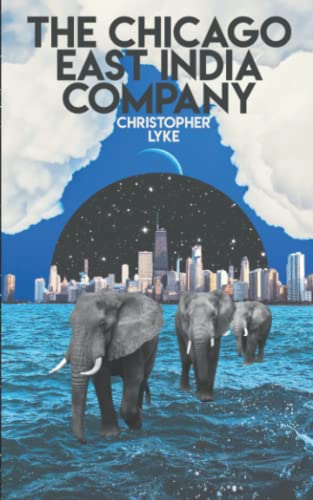A series of short stories and vignettes walk the reader through the consequences of two decades of war, and the attitudes it creates. An eighteen year old realizes his mortality and is punished for it by his peers; a soldier returns from the wars only to realize he’s teaching the colonized in his own city; a young couple go to Central America and see the effects of the West on class and opportunity; members of a platoon hunt to find a traitorous Afghan spy; and a man spends his days adhering to a strict and ridiculous routine to ward off the bad magic that is always around the corner. Lyke’s setting shifts in time and place but forever casts the main character of The Chicago East India Company as someone trying to maintain his sanity, his humanity, and his kindness as the state and its bureaucratic machinations unknowingly try to take them away.
In the tradition of Camus, Orwell or Steinbeck, Lyke’s work illuminates human nature, and seeks the truth hidden under layers of grit.
(from Amazon)
Chris’ note: I’m currently reading this one and I’d like to add that for me it reads a lot like ‘The Things They Carried in Afghanistan’, as well. Which is definitely not a bad thing.
More about this collection
The Chicago East India Company‘s Amazon page
Christopher Lyke’s Amazon author page
www.lineofadvance.org – a journal run by the author.
A sample story from Christopher Lyke at MilitaryExperience.org – this story appears in the present linked collection but with a new title (‘New Orleans’)
An in-depth interview with author Christopher Lyke – at Double Dagger publishing’s website. There is an interesting discussion of military service’s influence on artistic creation which is worth reading!
Also, the author says this tidbit about linked short stories and its connection to music which I resonated a lot with:
[The interviewer:] I want to talk about the work itself now. “The Chicago East India Company” has an interesting structure, using short stories that are linked by theme and feeling more than anything else, though there is more of a thread through the Afghanistan stories. Why did you decide to frame the book the way you did?
[Christopher Lyke:] I was intentionally copying a couple things. Hemingway’s “In Our Time” is set up like this, with a story then a vignette, then a story, etc. so that was in the back of my mind. But really I was stealing from musician Bob Pollard and his band Guided By Voices. His ability to write perfect pop songs interspersed with noise collages and half songs is really freeing. It gave me license to include standalone vignettes that were just an idea, or what would be only a scene from a larger story.
This description reflects a lot of my own thinking about linked short story writing. (Oh, and In Our Time is also an awesome book!)
Quote
“We hunted the Sioux and all the while the little boys dragged garbage and waste to the burn pit. It all went in there. They dumped diesel on the shit and stirred. They poured diesel over all the plastic water bottles and ripped clothes. They threw a match and it all would burn. They would do this, and we would get on with our business. We’d leave in the morning before dawn. Watch some village. Take someone’s weapons. Give some hungry, scared people some trinkets and move along. We’d walk through the mountains, or along a road looking for bombs some asshole planted to try and kill us. We hiked through villages, up through mountains to waterfalls that fell from the rocks down to pools in the low ground. Women and children bathed and washed their robes. Purples and reds and yellows stitched with gold loops. They were shining, stinking people. And they had been bathing in this waterfall when the snow melted for hundreds of years. We’d watch and then head back home. Sometimes the other side would pick a fight, and sometimes he wouldn’t. When we tried to pick one, they’d vanish, and we’d be left with jackals and porcupines and shale rock. They’d slip back into the terraced villages and would be gone. ”
– Christopher Lyke. The Chicago East India Company (p. 10). Double Dagger Books. Kindle Edition. …

Leave a Reply